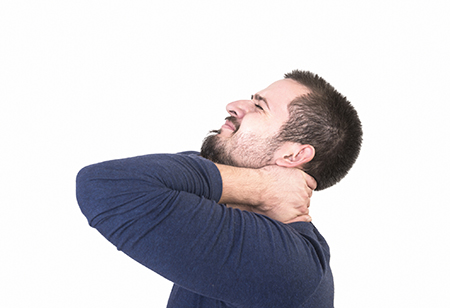Your neck is meant to move. If it hurts when you move it, you notice in a hurry.
Causes for neck pain range from sleeping wrong and having poor posture, to arthritis and herniated disks. Sometimes the pain is accompanied by tingling (pins and needles) or numbness in your hands, arms and/or shoulders, or pain in your chest muscles. These symptoms are the result of an ailment called cervical radiculopathy.
Pinched nerve in the neck

More commonly known as a pinched nerve, cervical radiculopathy occurs when a nerve root in your neck is irritated or injured. Pinched nerves are common and generally go away on their own. However, they can be severe, and you should call your doctor immediately if you begin to:
- Experience weakness or loss of strength in your arm or hand
- Have trouble gripping objects or lifting your arm
- Stumble or have difficulty walking
- Find it difficult to hold up your head
It's serious … now what?
Your doctor will perform an exam to diagnose the issue and may order an X-ray, CT or MRI scan before discussing treatment. Different options are available to help alleviate your symptoms, including:
- Non-surgical
- Physical therapy
- Massage
- Chiropractic care
- Osteopathic adjustments
- Acupuncture
- Trigger point injection
- Epidural injections
- Surgical
When other treatment methods have failed or been ruled out, it may be time for a surgical repair.
"Cervical radiculopathy is a common condition that typically resolves with conservative treatments, including physical therapy, manipulations, massage and acupuncture," says Amber Hennenhoefer, DO, an HonorHealth physical medicine physician. "If patients do not improve with conservative treatments, then more invasive treatments can be performed such as cervical epidural steroid injections, and finally, surgical interventions, if needed."
Is a pinched nerve preventable?
While not always preventable, some steps you can take to avoid a pinched nerve include:
- Taking a break and stretching
- Limiting repetitive tasks
- Avoiding sitting for long periods of time
- Participating in daily physical activity
- Practicing caution when lifting heavy objects
- Using proper ergonomics
- Choosing the right pillow
- Maintaining good posture
- Setting up your workstation ergonomically